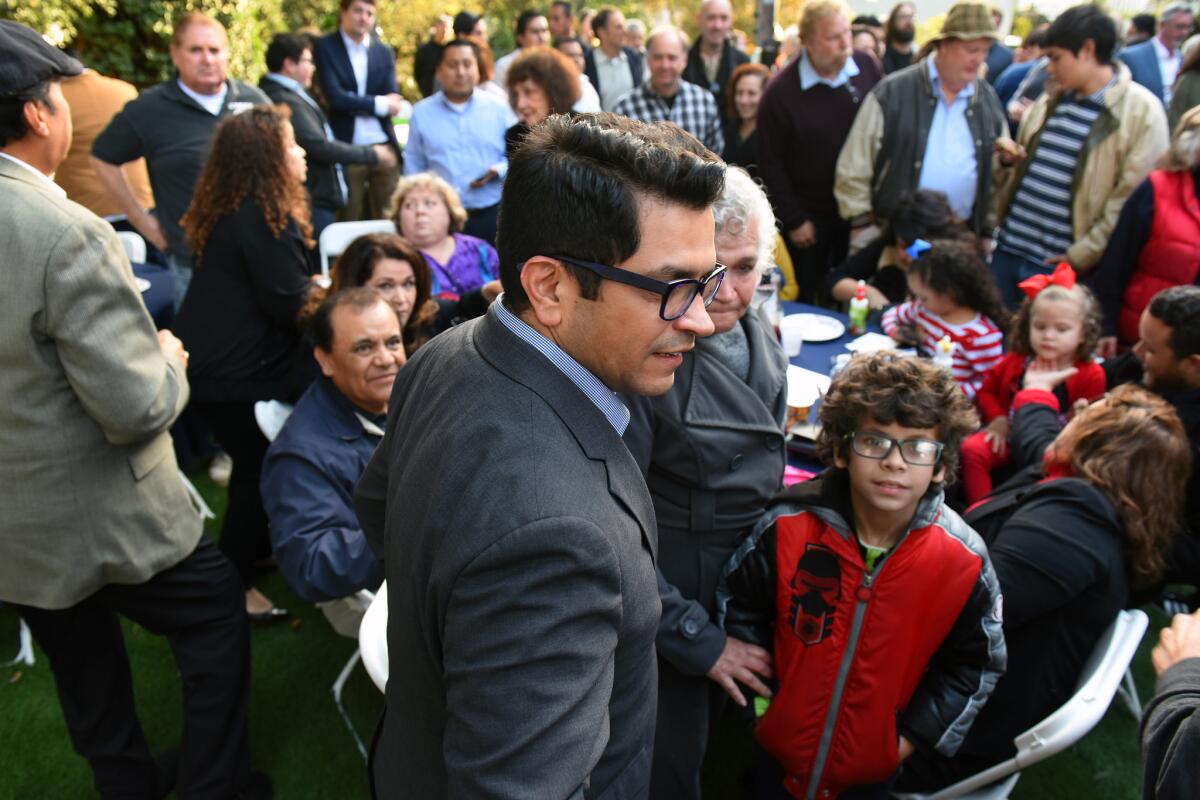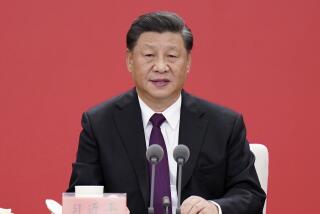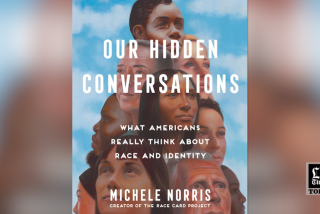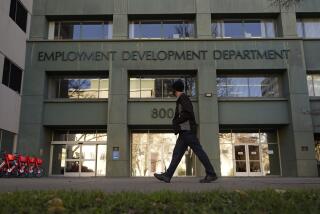Half the candidates in L.A.’s latest congressional race have their own immigrant story. With Trump, this contest is personal

For many of the candidates in the crowded race to fill a rare open congressional seat in central Los Angeles, the stories of how they came to be in this country are strikingly similar: They are immigrants, or the children of immigrants.
Wendy Carrillo was 5 when a smuggler drove her, her aunt and her grandmother across the border.
State Assemblyman Jimmy Gomez tells the story of how his father worked as a bracero, or manual laborer, in the 1960s, then married and raised kids in Mexico before moving his family to the U.S.
Vanessa Aramayo was raised mostly by her mother, a Mexican immigrant who worked for years at factory jobs before saving enough money to open a restaurant with her six sisters.
Of the 23 candidates who will appear on the ballot in the first congressional primary since the election of President Trump, two are immigrants and 11 are the children of immigrants. Whoever wins the seat previously held by state Atty. Gen. Xavier Becerra will be serving under a president who has moved to block refugees, vowed to build a massive border wall and threatened to deport millions of immigrants who are in the country illegally.
For them and many in this district, where two-thirds of residents are Latino and nearly half were born in other countries, the election is personal and expectations for the winner are high.
Luis Hernandez, a voter in Highland Park who was 15 when he escaped El Salvador with his family, says he empathizes with the refugees who have been blocked from entering the country.
“We were living through war, bombings, killings,” Hernandez said on a recent afternoon, as he left the Highland Park Super A grocery store with his son.
Hernandez, 50, says his younger brother doesn’t remember what it was like to cross the border. His brother voted for Trump and complains that Los Angeles has gotten too crowded with immigrants here illegally.
“I tell him that they all deserve opportunities, not just us,” Hernandez said.
If Trump follows through with the mass deportations he campaigned on, the effect could be dramatic in the 34th Congressional District, which stretches from downtown Los Angeles to Boyle Heights and incorporates Highland Park, Eagle Rock and Koreatown. These neighborhoods, which were transformed in the 1960s and 1970s from largely white, middle-class areas to majority-Latino enclaves of largely Mexican and Central American immigrants, have changed again.
In Highland Park and Eagle Rock in particular, professionals and members of the creative class have moved in, bringing with them yoga studios, craft beer stores and gourmet restaurants that coexist next to the accountants’ offices and printing shops that have been there for decades.
Latinos still make up 65% of residents in the district, but only 38% of them are eligible to vote, one of the lowest rates of any California congressional district. Los Angeles and Orange counties are home to an estimated 1 million immigrants living here illegally.
Becerra, himself the son of immigrants, fought back conservative efforts to curtail bilingual education and block access to services for immigrants in the country illegally.
While many consider Becerra’s legacy on immigrant rights unassailable, activists in his district were sometimes frustrated by the 12-term congressman’s pragmatism. Becerra, who rose to become the highest-ranking Latino in Congress, was at times stymied by his duties as a party leader. He voted, for instance, to pass the Affordable Care Act even though it denies health insurance to workers here illegally.
Becerra’s successor, who will enter Congress as a freshman member of a minority party, will likely be freer to advocate more forcefully for immigrants. And the electorate may demand it.
An early poll of 34th District voters by Latino Decisions found immigration ranks as an important agenda item with voters, just below healthcare but on par with “opposing Trump” and “standing up for us.” In the crowded field, state Assemblyman Gomez has the most name recognition and establishment endorsements, but that same early poll indicated voters did not have an overwhelming favorite.
With the primary election set for April 4, no candidate is likely to get more than 50% of the vote, and a probable runoff between the top two primary finishers is scheduled for June 6.
“Voters are going to be looking for not just a safe vote on the issues but someone who is going to have that fire in the belly at a time when they need a warrior,” said Jaime Regalado, a professor emeritus of political science at Cal State Los Angeles who has watched the race closely.
When federal immigration officials made more than 160 arrests throughout Southern California this month, several contenders for the seat reacted with fiery tweets in support of those detained, with one candidate calling on the public to demand their release.
Carrillo, now a 36-year-old activist and former journalist, still remembers the Mickey Mouse shirt she wore when she crossed the border after fleeing war-torn El Salvador in 1986 to meet her mother, who worked as a nanny to pay off the smuggler who drove them. She says she heard about the latest arrests while she was driving to file papers to run for the seat. For many of the people in the district she’s encountered during the campaign, she said, such arrests are among their worst fears.
“[People] are not sure they want to send their kids to school, not sure they want to report crimes when they see them,” Carrillo said. Her stepfather, the son of a bracero, eventually won residency for her and her mother, and Carrillo later became a citizen. She says she would start her congressional career by trying to preserve President Obama’s Deferred Action for Childhood Arrivals program, which allows young people brought to the country illegally as children to live and work in the U.S.
For the vast majority of candidates, the question isn’t if they will fight Trump’s immigration policies, but how. That’s not surprising: Aside from the lone Republican, a Green Party candidate, a Libertarian and an independent, the remaining hopefuls are running as Democrats in a district where Democrats outnumber Republicans six to one.
At a campaign kickoff, Assemblyman Gomez spoke as his mother sat at a table front and center with other family members. As he talked about the struggles his parents endured, he paused to look at her. “No llores, Mamá — Don’t cry, Mom,” he said in Spanish.
“For the son of immigrants to run for elected office, not even a generation after my parents got here, that’s what makes America a great place,” Gomez said. He was born in the U.S. along with his brother, but his parents and four other siblings lived illegally in the shadows for years. All later successfully petitioned for permanent residency. Gomez said his 9-year-old nephew is afraid that his mother, who is still a permanent resident, could get deported under Trump.
“The people I know, they’re immigrants who keep their nose to the ground, they work hard, they don’t ask the system for anything,” said Aramayo, a public relations consultant. “They’re looking for a leader who’s going to be bold and brave and fight [Trump].”
Steven Mac, an L.A. County prosecutor and an officer in the U.S. Army Reserve, says he’d take a more nuanced approach.
“If we’re yelling and screaming at Trump, he’s not going to change his mind,” Mac said. “Our main job is to convince the rest of America … and convince members in the House of Representatives.”
Mac says he supports military service as a pathway to citizenship — an idea backed this year by at least one California House Republican — and a federal law similar to DACA to protect people brought to the U.S. illegally as children.
His parents fled Vietnam as refugees in the 1970s and later became U.S. citizens. His father has worked in Chinatown restaurants for most of his life, and his mom still runs the family dry cleaning business. He often thinks about what might have happened to them if a refugee ban had blocked them from moving to the U.S.
Even William “Rodriguez” Morrison, a perennial candidate for local offices and the lone Republican running, wouldn’t support many of the immigration policies Trump campaigned on, including the border wall and large-scale deportation of immigrants. His father was a Jamaican immigrant, and his maternal grandparents came from Mexico.
“If they’ve lived here, gotten their education here, this is just as much their homeland as it is ours,” Morrison said.
For more on California politics, follow @cmaiduc.
ALSO:
Orange County’s new ‘homegrown’ congressman plans to bring an immigrant’s perspective to Washington
For attorney general nominee Xavier Becerra, immigration is a personal issue
Updates on California politics
More to Read
Get the L.A. Times Politics newsletter
Deeply reported insights into legislation, politics and policy from Sacramento, Washington and beyond. In your inbox three times per week.
You may occasionally receive promotional content from the Los Angeles Times.







